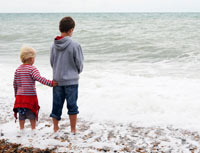
Almost one-fifth of 11 to 17-year-olds across the UK have been severely abused or neglected in childhood, findings released by the NSPCC today reveal.
In 2009, the charity surveyed 2,275 children aged 11-17 and 1,761 adults aged 18-24 about their childhood experiences. The first of the findings are released today, with more to follow.
The survey revealed 18.6% of the 11 to 17-year-olds surveyed had been sexually abused, severely neglected or physically attacked by an adult. Just over one quarter (25.3%) of the 18 to 24-year-olds reported severe maltreatment during childhood.
Parents or guardians were responsible for more than half (55%) of serious adult violence, it found.
According to the NSPCC’s chief executive, Andrew Flanagan, the survey raises concerns that the “vast majority” of abused children are not getting enough help from statutory services or community support networks. He said earlier intervention in child protection was needed.
Andrew Flanagan said: “Physical violence, neglect and forced sex are still harming the lives of hundreds of thousands of children…. Successive governments have taken steps to improve child protection but local authorities are under strain providing child protection plans for only a small proportion of cases.
“The scale and impact of child abuse requires a major shift towards earlier intervention in child protection. When children do not get the protection and support they need when they most need it, they can be vulnerable to continuing physical or mental harm and further abuse.”
Social workers, teachers and other relevant professionals must work together to identify possible signs of abuse and neglect and help prevent long-term harm, he said.
But the survey – along with an earlier study conducted by the NSPCC in 1998-99 – does reveal falling levels of some childhood abuse and neglect over the last 30 years such as prolonged verbal abuse.
Flanagan said the research gives a “fuller and more up-to-date picture of child abuse and neglect than we have ever had before”.
“However, these findings show progress can be made in the fight against child cruelty – many children are now treated less harshly than previous generations. We believe that heightened awareness and action has contributed to changing public attitudes and behaviours towards children for the better.”
It was announced today that the NSPCC will be awarded a government grant worth £11.2 million over the next four years for continued investment in ChildLine and the NSPCC HelpLine.
Key statistics:
• The number of 18 to 24-year-olds beaten up, knocked down, choked or threatened with a weapon in childhood, had dropped from 13% in 1998-99 to 10% in 2009. Such violence on a regular basis had dropped even more sharply – from 6% to 2% in 2009.
• Five per cent of young adults had been raped or forced or coerced into sex acts before the age of 16, compared to 7% in the previous study.
• The number suffering prolonged verbal abuse by adults during childhood had dropped by more than a half – from 14.5% to 6%
The survey of 11 to 17-year-olds (not measured in the 1998-99 survey) shows:
• One in five (18.6%) had been physically attacked by an adult, sexually abused, or severely neglected at home.
• One in 14 (6.9%) had been physically attacked by an adult, which included being hit, kicked, beaten or attacked with a weapon.
• One in 20 (4.8%) had been sexually assaulted – either by an adult or another child or young person. Three per cent of children had been raped or forced into sex by another child and 2% had been sexually abused by an adult.
• Physical neglect, such as malnourishment, was suffered by 1.4% of children. In all, one in 10 children (9.8%) suffered severe parental neglect at some point in their childhood. Lack of care or supervision which placed a child at risk, and neglect of emotional needs was the most common form of child maltreatment.
What do you think? Join the debate on CareSpace
Keep up to date with the latest developments in social care. Sign up to our daily and weekly emails
Related articles
Inform subscribers: Guide to risk assessment of child neglect
NSPCC chief executive: ‘More children should be taken into care’


 Bournemouth, Christchurch and Poole
Bournemouth, Christchurch and Poole  Hampshire County Council
Hampshire County Council  Lincolnshire County Council
Lincolnshire County Council  Norfolk County Council
Norfolk County Council  Northamptonshire Children’s Trust
Northamptonshire Children’s Trust  South Gloucestershire Council
South Gloucestershire Council  Wiltshire Council
Wiltshire Council  Wokingham Borough Council
Wokingham Borough Council  Children and young people with SEND are ‘valued and prioritised’ in Wiltshire, find inspectors
Children and young people with SEND are ‘valued and prioritised’ in Wiltshire, find inspectors  How specialist refugee teams benefit young people and social workers
How specialist refugee teams benefit young people and social workers  Podcast: returning to social work after becoming a first-time parent
Podcast: returning to social work after becoming a first-time parent  Podcast: would you work for an inadequate-rated service?
Podcast: would you work for an inadequate-rated service?  Family help: one local authority’s experience of the model
Family help: one local authority’s experience of the model  Workforce Insights – showcasing a selection of the sector’s top recruiters
Workforce Insights – showcasing a selection of the sector’s top recruiters 

 Facebook
Facebook X
X LinkedIn
LinkedIn Instagram
Instagram
Comments are closed.